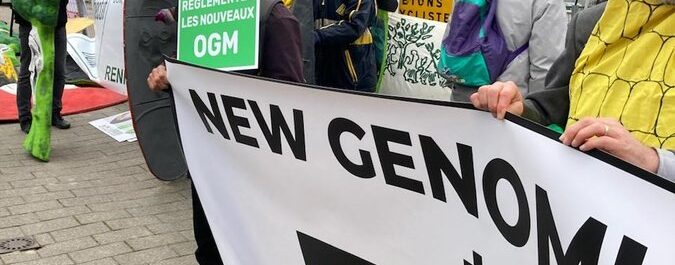European Coordination Via Campesina Press Release
(Brussels: February 8, 2024) Yesterday, the Committee of Permanent Representatives (COREPER) of the Member States of the European Union met to try to reach a Council agreement on the proposal to deregulate GMOs/new genomic techniques (NGTs), on the basis of a compromise text from the Belgian Presidency. COREPER did not reach any agreement, which undermines the possibility of starting negotiations with Parliament and the Commission (so-called trilogue) before the European elections in June 2024. ECVC welcomes the opposition of EU Member States to this proposal, which doesn’t hold up to scrutiny. The Commission’s refusal to authorise States to ban the cultivation of NTGs in their territories, and the open door to the privatisation of all seeds by patents, denounced by ECVC since the beginning of this process, are the main blocking points. This is a victory for peasants’ organisations, which call on Member States to continue to defend the rights of farmers and consumers by opposing this unacceptable proposal.
However, yesterday, the European Parliament voted by a small majority in a plenary vote in favour of the deregulation of GMO-NTGs. ECVC strongly condemns this vote, which radically goes against farmers’ rights on seeds, citizens’ rights to GMO-free food, the precautionary principle laid down in Article 191 of the Treaty on the Functioning of the European Union (TFEU) and the EU’s international obligations.
MEPs voted in favour of a proposal that is legally inconsistent and doesn’t have any scientific basis, as recently pointed out by the French food safety agency ANSES. To pass this unacceptable vote, MEPs voted for smoke-and-mirrors amendments, making two promises that they will not be able to keep:
- MEPs claim that traceability of NTGs and product labelling will be guaranteed (amendments 264 and 265). Yet, they refused to make it mandatory to publish the methods for detecting and identifying GMO-NTGs. It will therefore be impossible to guarantee compliance with traceability obligations, and therefore labelling throughout the food chain. Without this guarantee, seed companies will be able to safely “forget” to claim that their seeds are NGTs.
- On patents, which is the main concern of peasants and small seed companies, MEPs claim that the non-patentability of NTGs will be guaranteed. The European Parliament certainly sends an interesting political signal when it proposes to amend European patent law (Directive 98/44/EC). However, this amendment will not be able to restrict the scope of a patent to the plant products resulting from the patented invention, in the absence of the publication of the information allowing patented genetic information to be distinguished from any other ‘native’ or traditional breeding genetic information. ECVC also recalls that the European Parliament cannot decide on its own initiative to amend European patent law. It can only validate, refuse or amend a Commission proposal, which only plans to publish a patent study in 2025. In addition, a possible amendment will then require the agreement of the European Patent Convention, which includes non-EU countries, and would be a long, complex and highly uncertain process.
There is therefore, as the proposal stands, no protection for peasants and small seed companies against patent abuse and infringement proceedings, which would become reality in the event of GMO-NGTs being deregulated, especially since any patent granted before this major problem is solved will remain valid for 20 years.
ECVC calls on the Council to maintain its opposition to the deregulation of GMO-NTGs, and on the European Parliament to adopt a resolution calling on the Commission to propose an amendment to European patent law, to protect the rights of farmers, small seed companies, and food sovereignty.

